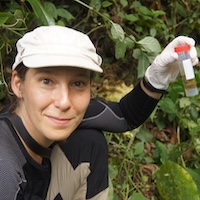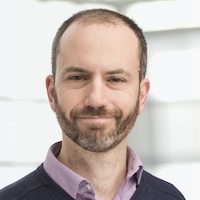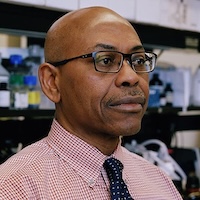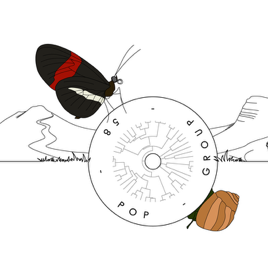Program
Program Overview Plenary Speakers Workshop Conference Dinner
Program Overview
Plenary Speakerss
We are delighted to announce three fantastic plenary speakers!
Katerina Guschanski
Senior Lecturer in Genomics, School of Biological Sciences, University of Edinburgh & Department of Ecology and Genetics, Animal Ecology, Uppsala University

About Katerina. The work in my group focuses on questions in speciation genomics, conservation genomics, and metagenomics. We like using samples that others tend to stay away from: feaces, bones, skins, and preserved bacterial biofilms contained in dental calculus. These samples have a story to tell, not only about the individual they come from but also about the time when this individual lived. It is this temporal aspect that we are most excited about.
Talk title: Old samples - new insights: Museum collections as time machines for questions in ecology, evolution, and conservation
Talk abstract: Evolution is an inherently temporal process. Yet, our ability to study it is often limited, as we are confined to the present. Historical (and archaeological) collection provide a glimpse of the past. This is particularly important in a rapidly changing world. Using ancient DNA techniques applied to natural history collections, researchers now identify and quantify the impact of recent anthropogenic disturbances on wild organisms. In vertebrates, these studies often highlight the detrimental effects of population declines, including loss of genetic diversity, increase in inbreeding and deleterious mutations, thus providing a foundation for practical conservation measures. In contrast, little is known about how human-driven environmental changes affect host-associated microbiomes and what consequences this may have for their mammalian host. I will present some examples of the use of museum collections to study the preserved oral microbiome of wild animals. These fossilised microbiomes capture the effects of environmental contamination with human-made products (e.g. antibiotics), have a potential role in host population declines, and may be important for adaptation. I hope to add a new dimension to studies of ecology, evolution and conservation by incorporating host-associated microbial communities into the eco-evolutionary framework and highlighting the importance of microorganisms for the ongoing biodiversity crisis.
Stephen Wright
Professor and Canada Research Chair in Population Genomics, Department of Ecology and Evolutionary Biology, University of Toronto

About Stephen. Research in the lab focuses on plant population and evolutionary genomics, with a particular focus on the causes and consequences of reproductive system evolution, and on understanding the genomic extent and dynamics of plant adaptation. Our goals are to use population and evolutionary genomics to test long-standing evolutionary theory, and to apply evolutionary perspectives to better understand genome structure and function.
Talk title: Adaptation and maladaption in plant genome
Talk abstract: What factors facilitate and constrain adaptation, and how does this influence plant genome evolution and diversity? In this talk, I will discuss research focused on two cases of extraordinary evolutionary parallelism acting on different timescales: the rapid evolution of herbicide-resistant weeds and the formation and degeneration of sex chromosomes. Using a combination of population and comparative genomics, these studies highlight the remarkable multifaceted adaptive potential of agricultural weeds, and the importance of recombination landscapes in driving the evolutionary trajectory and maladaptation of sex chromosomes.
Ravinder Kanda
Senior Lecturer in Evolutionary Genomics, Department of Biological and Medical Sciences, Oxford Brookes University
About Ravinder. Research in my group focuses on understanding the various evolutionary processes that have shaped the composition and evolution of genomes; more recently the focus has been on Endogenous Viral Elements (EVE’s) which constitute a substantial portion of vertebrate genomes. To date, much of the research in this area has focused on mammalian genomes. With the abundance of genomic data from a variety of species now available, we now have the opportunity to investigate the impact of these virally derived insertions across the tree of life.
Talk title: Stowaways in the Genome
Talk abstract: Most genomes consist of a substantial amount of sequences derived from transposable elements, including viruses (termed Endogenous Viral Elements, EVEs). While their diversity and impact on genome evolution has been well studied in humans and larger primates, considerably less is known about these insertions in the genomes of other species, especially outside of mammals. In this talk, I will discuss our recent knowledge of the implications of these stowaways on genome evolution, and current research projects in my group that highlight the potential uses of these genomic elements, and their diversity outside of mammals.
Charles Rotimi
Scientific Director, National Human Genome Research Institute, National Institutes of Health

Talk title: The complex and dynamic evolutionary history of African genomes in health and disease
Talk abstract: In this presentation, I will provide a deeper appreciation of how the geographical region today called “Africa” shaped human evolutional history, health, and disease through the lens of fossil records and genomics. I will discuss how the growing engagement of African populations in genome science is providing new insights into the forces that shaped human genomes before and after the Out-of-Africa migrations. I will use recent examples to discuss how exposure of Africans to fatal pathogens (e.g., Trypanosoma brucei rhodesiense), resulted in elevated frequencies of alleles conferring survival advantages for infectious diseases, but that are maladaptive in modern-day environments. I will discuss how the use of group labels such as “Blacks” or “Africans” may lead to the distortion of our understanding of the distribution of medically relevant genetic variation. Finally, I will advocate the systematic engagements of African populations in genomics as both a scientific imperative and a social justice issue.
Workshop
The NERC Environmental Omics Facility (NEOF) will provide a workshop titled Population Genomics on Monday afternoon 6th January, 2-5pm.
Join the NEOF bioinformatics team for this short session where we will demystify the process of using the command line to analyse genetic variation.
We will use an example data set of Illumina sequences to detect single nucleotide polymorphisms and plot patterns of genetic structure.
This session is aimed at beginners - anyone who has never used command line tools but would like to learn or plans to generate some sequencing data soon. No prior experience is necessary.
This hands-on workshop will cover: • Simple command line • Illumina sequencing data quality and cleaning • Aligning your reads to a reference genome • SNP calling and filtering • Population admixture and PCA plots
Important: You will require your own laptop that can connect to eduroam during the course, but you do not need to install any software as the workshop will run via a web browser.
We will charge a registration fee of £10 per person and you can register for the workshop as part of the general registration form for the Population Genetics Group meeting (see Registration).
Register to NEOF mailing list to hear first about future NEOF free bioinformatics courses: https://neof.org.uk/news/
Conference Dinner
The Conference Dinner will be held at Kelham Island Museum on Thursday 9th January. The museum showcases Sheffield’s industrial heritage, and guests will have time to explore the museum during their visit. There will also be a demonstration of The River Don Engine. Built in 1904, it is one of the most powerful steam engines ever constructed and has been used to make armour plates for battleships and reactor shields for nuclear power plants. A three course Dinner will then be held in the Upper Gallery before the tables are cleared away and the dancing starts! This year we have Powerhouse Ceilidh Band performing - Sheffield’s finest geek-rock-folk ceilidh band!
You can book a ticket for the Conference Dinner as part of the general registration form for the Population Genetics Group meeting (see Registration) at an extra cost of £60. Please note that places for the Conference Dinner are limited.


